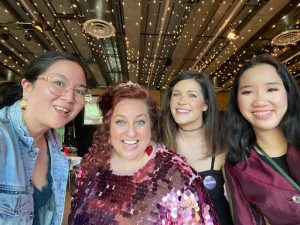It’s Innovation Month here at the UW, and we are highlighting Nancy Chang, an Evans alum who has worn many different hats since earning her MPA in 2007 and continues to forge new and inclusive approaches to addressing our society’s most pressing problems. We recently connected with Chang to learn more about her time at Evans and her public service work.
May 15, 2024
Alumni Spotlight: Nancy Chang, MPA ’07

What sparked your passion for public service?
Punk rock. As a teenager growing up in the PNW during the 90s, the Teen Dance Ordinance—aka Seattle’s “Footloose” period—created this youth centered organizing movement called the “all ages or DIY” scene that led me into social impact. This modern history was chronicled in “Let the Kids Dance! a new podcast from KUOW.
What led you to the Evans School, and what did you discover or learn that has influenced the way you approach your work?
Shannon Halberstadt—currently at the Department of Commerce’s Creative Economy—hired me in the early 2000s to work at the Old Fire House Teen Center which was the epicenter of pioneering work on a youth centered/co-creation approach to building community. Eventually, Halberstadt encouraged me to study for the GRE with her and to apply to the Evans School.
At the Evans School, I was exposed to a variety of public service students with different experiences and expertise all wanting to make our society a better place. What I saw was the importance of how to break siloed work through intersectionality and work in ecosystems. Fortunately, I still intersect with classmates who are now colleagues in the social good sector doing amazing work in their respective fields and amplify each other’s work.
Across the UW this month, we’re exploring the theme of “innovation.” Can you tell us about some work that you’ve been a part of in your career around leading change, setting a new vision, and exploring new ways of doing things?
Growing up in a Buddhist family helped me to seek out how to use my privilege to dismantle old narratives surrounding “isms” like misogyny, racism, classism, and homophobia. I don’t feel like I am doing innovative work, I am just standing up against narratives of oppression that stem from unresolved traumas that are sustained by colonial, imperial, white supremacy, and fossil fuel dependency narratives.
We are in a time of co-creating narratives that center around stewarding communities that are healthy and are people friendly. I was fortunate enough to belong to a community of all ages organizers that encouraged me to continue my work in capacity building in the South Salish Sea and beyond—from writing my capstone on launching Skate Like a Girl, to partnering with UW Bothell students in Dear Digital Equity to demystify digital equity. Now my current role is field organizing for F Minus, a climate action non-profit empowering citizens to marginalize fossil fuel lobbyists.
With innovation comes disruption. As a leader, how have you stayed focused through periods of change?
We are living in a new era of constant evolution and reiteration of ideas, and it requires us all to let go of past narratives that no longer serve us. Innovation requires that we center on grace and patience as others are catching up and pivoting. We must lean into participatory governance and human centered design to create new standards for working across sectionalities and undo ten years of immature and dysfunctional government at the federal level.